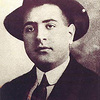Paul Leppin (1878–1945)
Autor(a) de Severin's Journey into the Dark
About the Author
Image credit: Paul Leppin ca. 1905
Obras de Paul Leppin
Associated Works
The Dedalus Book of German Decadence: Voices of the Abyss (Decadence from Dedalus) (1994) — Contribuinte — 71 cópias
The Dedalus/Ariadne Book of Austrian Fantasy: The Meyrink Years 1890-1930 (1992) — Contribuinte — 25 cópias
Etiquetado
Conhecimento Comum
- Nome padrão
- Leppin, Paul
- Data de nascimento
- 1878-11-27
- Data de falecimento
- 1945-04-10
- Local de enterro
- Vinohrady Cemetery, Prague, Czech Republic
- Sexo
- male
- Nacionalidade
- Czechoslovakia
- Local de nascimento
- Prague, Czechoslovakia
- Locais de residência
- Prague, Czechoslovakia
- Ocupação
- accountant
Membros
Resenhas
Listas
You May Also Like
Associated Authors
Estatísticas
- Obras
- 7
- Also by
- 4
- Membros
- 291
- Popularidade
- #80,411
- Avaliação
- 3.9
- Resenhas
- 5
- ISBNs
- 23
- Idiomas
- 5
- Favorito
- 7













